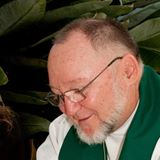Twenty-first Sunday after Pentecost
Proper 23: Sunday, Oct. 14, 2018 Year B
The word of God is living and active, sharper than any two-edged sword, piercing until it divides soul from spirit, joints from marrow; it is able to judge the thoughts and intentions of the heart. And before him no creature is hidden, but all are naked and laid bare to the eyes of the one to whom we must render an account.
Since, then, we have a great high priest who has passed through the heavens, Jesus, the Son of God, let us hold fast to our confession. For we do not have a high priest who is unable to sympathize with our weaknesses, but we have one who in every respect has been tested as we are, yet without sin. Let us therefore approach the throne of grace with boldness, so that we may receive mercy and find grace to help in time of need. (Hebrews 4:12-16)
Mark’s Gospel (10:17-31) recounts the story of the man who asks Jesus what he must do to inherit eternal life. Jesus lists the commandments. The man says he has observed all of the commandments since he was young. Jesus looks lovingly and deeply into the man’s soul and says, “You lack one thing; go, sell what you own, and give the money to the poor, and you will have treasure in heaven; then come, follow me.”
At first, Jesus seems to give us a dry list of “dos” and “don’ts.” But then, looking deeply and lovingly into the man’s soul, he ends up saying something like, “you must give it all.”
The lectionary places this passage illustrating Jesus’ sharply penetrating insight into the human soul alongside a passage from Hebrews about the Word of God. Interestingly, this passage concludes a chapter-long discussion from Hebrews about “Sabbath rest.” “Sabbath rest” is a Jewish euphemism or alternative expression for “eternal life.” Therefore, both passages are concerned with the same issue. How does one live in such a way as to inherit eternal life?
The passage from Hebrews is often used to describe the power of the Holy Scriptures in our lives. While this is a perfectly correct interpretation, it misses the larger context. The “soul surgery” performed on the Christian by the Word of God is the answer to the question about how to enter into Sabbath rest/eternal life. The soul surgery of God’s Word is the mechanism whereby we are perfected by God’s Holy Spirit.
The passage describes the knife, the victim, and the High Priest. The sacrificial knife is the Word (commandment/will) of God, which cuts wisely, deeply, and precisely. The High Priest is Jesus, who knows, and has experienced, and has beaten, every temptation you have ever suffered. But who is the sacrificial victim, lying naked with throat laid bare? Who is the one trusting the High Priest? Is it you?
Fortunately, God does not require that we be sacrificed on the altar. Jesus is both priest and victim. We are neither. But He does invite us, even require us to submit ourselves to the Great Surgeon of the soul, Jesus, so that we can become holy as He is holy.
– Father John Liebler, ordained in 1981, is now the semi-retired rector of St. Simon the Cyrenian Episcopal Church in Fort Pierce.

